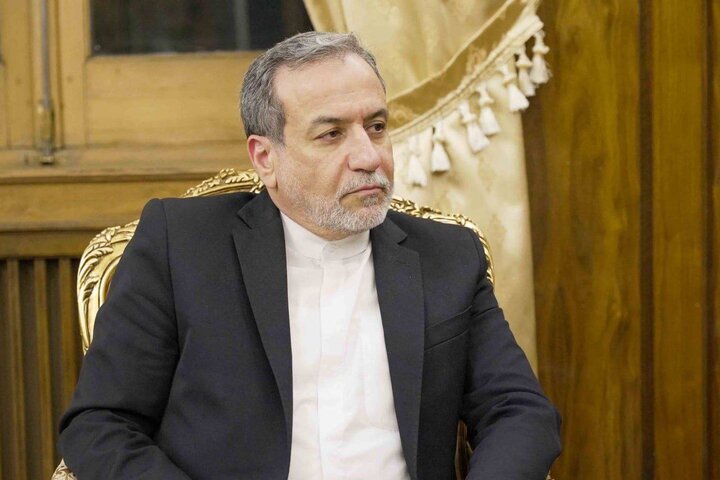Iran FM in China for ‘new chapter’ in bilateral ties

TEHRAN – Iranian Foreign Minister Abbas Araghchi has embarked on an official visit to China, aiming to deepen the longstanding partnership between Tehran and Beijing.
Araghchi and his delegation arrived in Beijing on Friday at the invitation of his Chinese counterpart, Wang Yi.
Speaking to reporters upon his arrival in Beijing, Araghchi described his trip as a critical opportunity for consultations on key regional, international, and bilateral issues. "The primary purpose of this visit is to engage in consultations on regional, international, and bilateral issues," he said.
Reflecting on the longstanding partnership between Iran and China, the minister noted, "For years, we have consistently maintained close consultations with China on all regional and international matters. The current situation is highly sensitive, with escalating tensions in the region and numerous international challenges. Furthermore, our nuclear discussions will encounter new dynamics in the coming year, making increased dialogue with China essential."
Araghchi emphasized the strength of Iran-China bilateral relations, stating, "These relations have always been solid and remain strong. It is only natural that we continue our dialogue on various issues to address shared concerns."
He also highlighted the timing of the visit, calling it particularly significant. "This trip coincides with an opportune moment and aligns with the invitation from our Chinese friends. At the start of the new year, we aim to strategize and prepare for the challenges ahead, including those related to the region, global developments, and the United Nations Security Council," Araghchi explained.
‘Start of a golden era’
In an article published in China’s People’s Daily on the day of his arrival, Araghchi highlighted the importance of the visit in shaping the “next golden 50 years” of cooperation between the two countries.
He underscored Iran and China’s mutual commitment to multilateralism, economic collaboration, and shared opposition to unilateralism in international affairs.
"The next golden 50 years of Iran-China relations will demonstrate that this visit marks the beginning of a new chapter of strategic cooperation between the two countries," he wrote.
The Iranian foreign minister highlighted the deep-rooted cooperation between Tehran and Beijing, including political and defense coordination, the exchange of high-level delegations, and joint initiatives such as the Belt and Road Initiative (BRI) and the Shanghai Cooperation Organization (SCO).
He also pointed to their collaboration in the BRICS group of emerging economies and their role in brokering peace in the region, including the landmark agreement between Iran and Saudi Arabia in March 2023.
"Iran and China share common interests and concerns not only at bilateral and regional levels but also on trans-regional and international platforms," Araghchi noted. Both nations, he added, firmly believe in multilateralism and work together in global mechanisms to promote shared prosperity.
Araghchi also turned his attention to pressing issues in West Asia, particularly the humanitarian crisis in Gaza. He condemned Israel’s ongoing genocide, supported by certain world powers, and called for an immediate ceasefire and delivery of humanitarian aid. He criticized the international community's inaction, calling it a failure of responsibility.
On Syria, the minister reiterated Iran’s stance on respecting the country’s sovereignty and territorial integrity, emphasizing that the Syrian people should determine their own future without external interference.
"We are witnessing unprecedented changes in the world that have simultaneously created complex opportunities and challenges," Araghchi said, stressing that countries are at a historical crossroads between cooperation and confrontation, openness and exclusion, chaos and peace.
Araghchi criticized states that impose their values and interests on others through coercion, sanctions, and double standards. He argued that dividing the world into "democratic" and "non-democratic" blocs distorts reality and undermines global harmony. "Iran and China will always stand on the right side of history," he said, vowing to champion development, cooperation, and friendship among nations in the Global South while resisting unilateralism and bullying.
China remains Iran’s largest trading partner, and both countries have faced sanctions imposed by the United States. Their relationship was solidified in March 2021 with the signing of a long-term strategic partnership agreement aimed at reinforcing their economic and political alliance.
Iran's former ambassador to China, Mohammad Keshavarzzadeh, also emphasized the critical importance of strengthening Tehran's ties with Beijing in light of evolving global dynamics. Speaking in an interview with the Islamic Republic News Agency (IRNA), Keshavarzzadeh highlighted the changing international landscape and the potential resurgence of Donald Trump in the U.S. presidency as key factors necessitating closer cooperation between the two nations.
"Given the current circumstances the international community is experiencing, coupled with the potential return of Donald Trump to power in the United States, the development of Iran's relationship with China is no longer a matter of choice but has become an unavoidable necessity," Keshavarzzadeh remarked.
